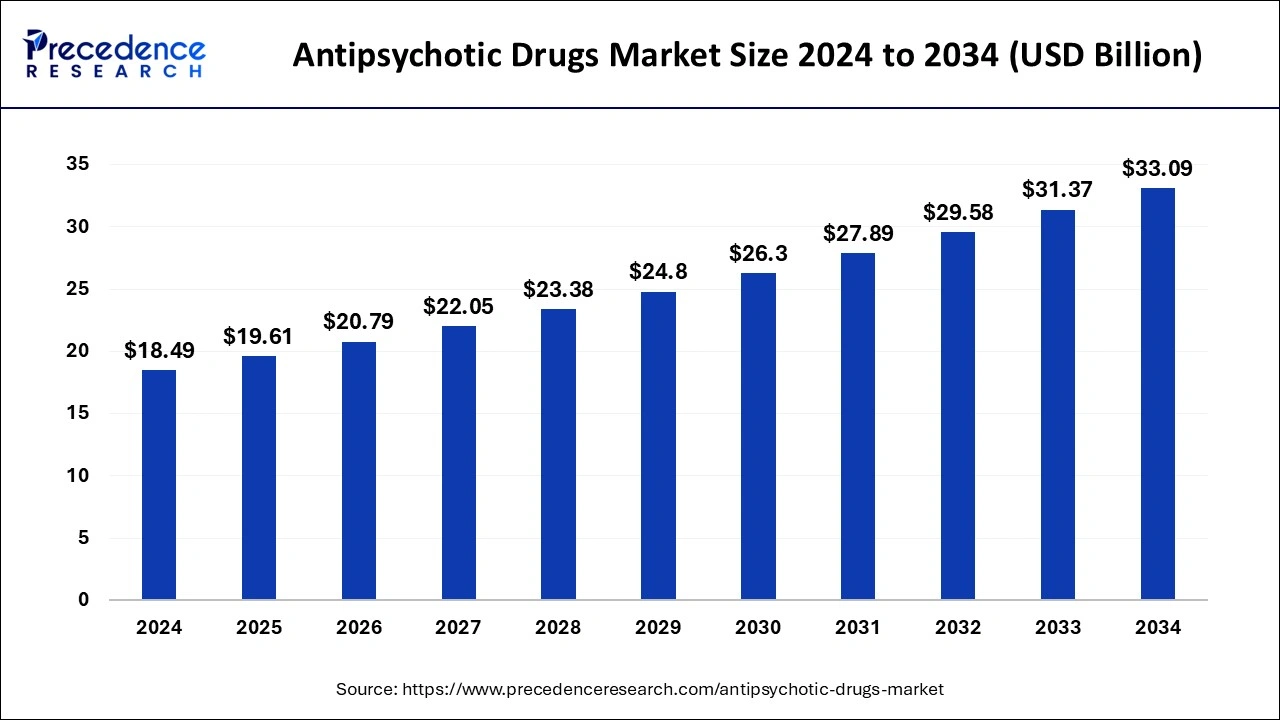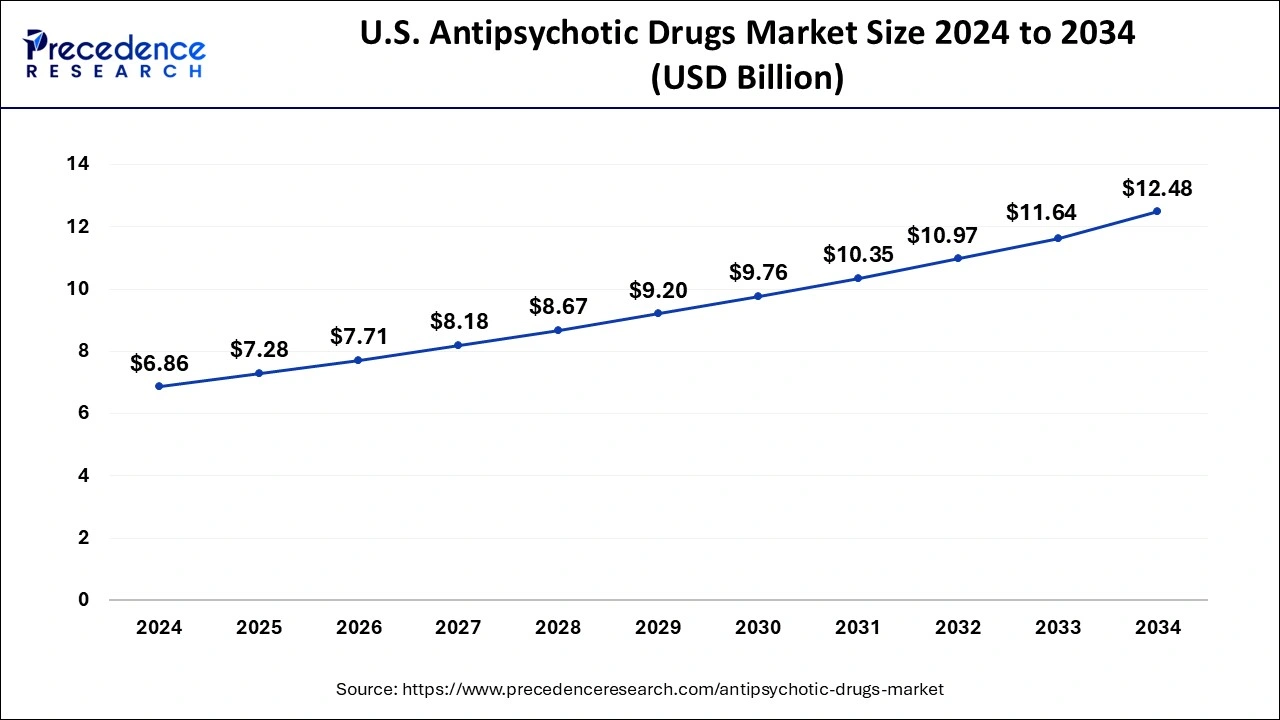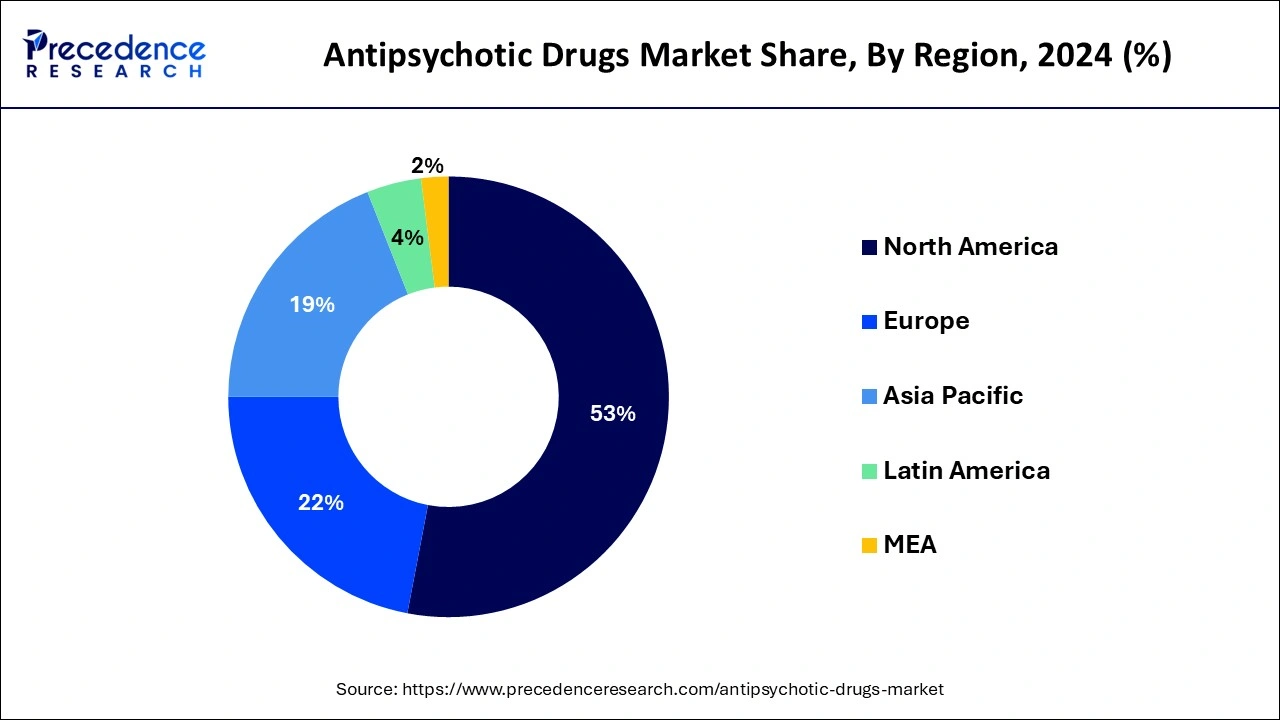Antipsychotic Drugs Market Size and Forecast 2025 to 2034
The global antipsychotic drugs market size was estimated at USD 18.49 billion in 2024 and is predicted to increase from USD 19.61 billion in 2025 to approximately USD 33.09 billion by 2034, expanding at a CAGR of 5.99% from 2025 to 2034.

Antipsychotic Drugs MarketKey Takeaways
- The global antipsychotic drugs market was valued at USD 18.49 billion in 2024.
- It is projected to reach USD 33.09 billion by 2034.
- The antipsychotic drugs market is expected to grow at a CAGR of 5.99% from 2025 to 2034.
- North America held the largest share of the market share of 53% in 2024.
- Europe is anticipated to gain a considerable market share in the upcoming years.
- By disease, the schizophrenia segment dominated the market in 2024.
- By disease, the bipolar disorder segment is observed to carry a significant share over the forecast period.
- By therapeutic class, the second-generation segment dominated the market in 2024.
- By therapeutic class, the third-generation segment is expected to grow at the fastest rate during the forecast period.
- By drug, the aripiprazole segment held a significant share of the market in 2024.
- By drug, the paliperidone palmitate segment is expected to grow at a significant rate during the forecast period.
- By distribution channel, the hospital pharmacies segment is expected to hold the largest market share during the forecast period.
- By distribution channel, the drug stores & retail pharmacies segment is expected to witness a notable rate of growth during the forecast period.
U.S.Antipsychotic Drugs Market Size and Growth 2025 to 2034
The U.S. antipsychotic drugs market size was estimated at USD 6.86 billion in 2024 and is predicted to be worth around USD 12.48 billion by 2034 at a CAGR of 6.17% from 2025 to 2034.

North America led the market with the biggest market share of 53% in 2024, the region is observed to sustain the position throughout the forecast period. The strong prevalence of psychiatric illness in the region and the presence of top biopharmaceutical companies are several factors that drive market growth in the region during the estimated period. Furthermore, other factors, including the strong adoption of antipsychotics with technological authority in the region and general awareness of critical mental illness in the region, are anticipated to fuel the market growth.
- According to a report published by the National Center for Biotechnology Information in March 2023, 57.8 million adults in the United States had mental illness in 2021.
- As per the report published by the Alzheimer Society of Canada in September 2022, an estimated 1.7 million Canadians are expected to live with dementia by 2050.

Europe is anticipated to gain a considerable share of the antipsychotic drugs market over the forecast period. The great incidence of mental disorders in the area and rising awareness of psychiatric problems are to account for this. The rising focus on the development of advanced therapeutics for mental disorders in the region is observed to act as a growth factor for the market's expansion. Moreover, the market is observed to grow.
- According to an article published by Informa UK Limited in April 2022, aging populations in developed nations are leading to more older adults with psychiatric disorders.
Market Overview
Antipsychotics are medications used to treat severe mental illnesses like psychosis, as well as other emotional and mental disorders. They can also help relieve persistent hiccups and pain caused by restlessness in palliative care. Psychosis makes a person lose touch with reality, often leading to hallucinations or delusions. Hallucinations involve hearing voices that aren't real, while delusions are beliefs not based on reality. These medications help manage symptoms of psychosis and other mental health issues like bipolar disorder and mood disorders, which could potentially lead to psychosis. They work by adjusting neurotransmitter levels in the brain, which are chemicals that transmit messages throughout the brain. Antipsychotics mainly affect dopamine, a key neurotransmitter. An overactive dopamine system is thought to contribute to the hallucinations and delusions experienced during psychosis.
Antipsychotic Drugs MarketGrowth Factors
- A rise in efforts by key players to expand the therapeutic applications of neurological drugs is anticipated to create opportunities in the antipsychotic drugs market.
- The growing incidence of schizophrenia and bipolar disorder is likely to create demand for these medications.
- The increasing geriatric population and prevalence of mental diseases further boost the growth of the antipsychotic drugs market.
- The demand for antipsychotic drugs is also growing because of the rise in information about mental illnesses.
- The increased prevalence of psychosis globally is one of the key factors driving the antipsychotic drugs market.
Market Scope
| Report Coverage | Details |
| Growth Rate from 2025 to 2034 | CAGR of 6.05% |
| Market Size in 2025 | USD 17.43 Billion |
| Market Size by 2034 | USD 31.37 Billion |
| Base Year | 2024 |
| Forecast Period | 2025 to 2034 |
| Segments Covered | By Therapeutic Class, By Disease, By Drug, and By Distribution Channel |
| Regions Covered | North America, Europe, Asia-Pacific, Latin America, and Middle East & Africa |
Market Dynamics
Driver
Rise in mental diseases worldwide
Healthcare systems and service providers are currently under stress due to the rise in mental diseases globally. The government is now focusing on creating a high and reliable level of information about diseases and their associated systems. Furthermore, the market players are investing and giving their best resources to innovate highly efficient and secure drugs that can be applied to treat people with mental disorders in all countries. Physicians are using telemedicine to deliver effective OTC treatments and provide guidelines on dispensing medications. This factor can also drive the growth of the antipsychotic drugs market.
- An August 2023 article published by the open access government signifies the use of telemedicine. Telemedicine overcomes the physical limitations of conventional services by utilizing a variety of applications such as telephone, video-conferencing platforms, and wearable devices.
Restraint
Lack of awareness about medications
The major factor expected to hinder the growth of the antipsychotic drugs market during the forecast period is a lack of knowledge and awareness about these medications. Most people are unaware of the fact that the incidence of psychotic disorders is increasing day by day worldwide. Moreover, even the patients who are suffering from this disease are unaware of the treatment and therapies that can benefit them in the future. This also prevents market players from expanding their business on a large scale.
Opportunities
Technological advancements and government funding
The antipsychotic drugs market is growing due to advancements in medical technology and increased competition. Government funding is expected to increase, and businesses will invest more in research and development (R&D), creating new opportunities for income and market expansion. The government is making efforts to educate the public about diseases and the effectiveness of medicines used to treat them.
Additionally, there is a growing demand for effective and safe medicines to treat patients with psychotic disorders worldwide. Companies are also focusing on developing injectable antipsychotic medications to address the need for easier monitoring of patients' drug intake.
- In May 2023, The FDA approved risperidone (Uzedy, Teva, and MedinCell), an extended-release injectable suspension and long-acting subcutaneous atypical antipsychotic injection for the treatment of schizophrenia in adults. According to a press release, the injection uses technology to control the steady release of risperidone, and therapeutic blood concentrations are reached within 6 to 24 hours of a single dose. It also offers flexible 1- and 2-month dosing intervals.
Efforts made by the WHO
Increasing efforts by the WHO to treat dementia and a rise in awareness about mental disorders are driving demand for these drugs. Moreover, the rise in mental disorders such as bipolar and schizophrenia among most of the population and investments made by government and private organizations are major factors in boosting the antipsychotic drugs market's growth.
- According to data published by the World Health Organization (WHO) in March 2023, approximately 55 million people in the globe have dementia, and 60% of them are from low and middle-income countries in 2022.
Disease Insights
The schizophrenia segment dominated the antipsychotic drugs market in 2024and is expected to grow at the fastest pace. This leading position is attributed to the strong prevalence of these diseases worldwide. Combined with many product launches, the rising geriatric population who are more prone to the onset of schizophrenia is also raising the demand for the medications used in this disease.
- According to the World Health Organization, in 2022, schizophrenia affected 24 million people worldwide.
- According to a report published by the United Nations in 2022, the share percentage of older adults worldwide is projected to increase from 10% in 2022 to 16% by 2050. The geriatric population is more susceptible to neurological disorders and continues to experience worse situations later in life.
Besides the schizophrenia segment, the bipolar disorder segment is observed to hold a significant share of the antipsychotic drugs market. Bipolar syndrome is considered the 6th largest contributor among the total disabled patients in the world by WHO; this can further drive the segment growth in the future.
Therapeutic Class Insights
The second-generation segment held the largest share of the antipsychotic drugs market over the forecast period. The segment's growth is linked to the presence of a huge number of second-generation drugs in the market, like HAFYERA, INVEGA, SEROQUEL, XR, ZYPREXA, etc., which are prominent second-generation drugs in the market. Moreover, the improved efficiency and safety of the drugs from this generation will drive the growth of the market.
The third-generation segment is expected to grow at the fastest rate during the forecast period in the antipsychotic drugs market. New technological advancements compared to other classes of medicine are some factors that contribute to the overall growth of the antipsychotic drugs market. The upcoming innovation in the drug development procedures is also observed to create a significant driver for the segment's growth.
Indication Insights
The schizophrenia segment held the major market share in 2024. Schizophrenia causes psychosis and is associated with considerable disability. Schizophrenia is a type of neurodevelopmental disorder, and growth factors are important regulators of brain development, cell survival, and migration. According to the article published by the World Health Organization (WHO) in January 2022, Schizophrenia affects approximately 24 million people or 1 in 300 people (0.32%) worldwide. This rate is 1 in 222 people (0.45%) among adults.
On the other hand, the bipolar disorders segment is projected to grow at a CAGR between 2025 and 2034. Bipolar disorder is a serious mental health condition. The rising prevalence of bipolar disorder drives the demand for antipsychotic drugs. Moreover, increasing research and development efforts have led to the introduction of new and more effective antipsychotic drugs for the treatment of bipolar disorder.
Distribution Channel Insights
The hospital pharmacies segment held the largest share of the antipsychotic drugs market in 2024. The segment is observed to sustain the position throughout the forecast period. This is because most treatment medications require prescriptions from qualified medical professionals after thorough examinations conducted at these institutions. Hospital pharmacies usually offer precise therapeutics with prescriptions. Thereby, the rate of purchasing antipsychotic drugs from hospital pharmacies is comparatively high.
The drug stores & retail pharmacies segment is expected to gain a significant share of the antipsychotic drugs market. These places are important for obtaining prescription refills, particularly for oral medications. Multiple pharmacy stores have started offering product knowledge at stores or via sites, this makes it even more convenient for buying drugs for patients.
The retail pharmacies segment accounted for the dominating share in 2024. Retail pharmacies have a robust presence around the world and provide convenient access to antipsychotic drugs for outpatients, which makes it easier for patients to effectively manage their mental health conditions. The healthcare professionals of retail pharmacies ensure patients receive appropriate and timely medication.
On the other hand, the online pharmacies segment is expected to witness a significant share during the forecast period. Online Pharmacies play a crucial role in dispensing medications and emerge as a convenient alternative for accessing antipsychotic drugs, especially in countries with strong digital infrastructure. Online pharmacies offer attractive discounts as well as ensuring the availability of antipsychotic drugs. Such attractive discounts and other value-added services that attract patients to online pharmacies are expected to fuel the growth of the segment as a significant distribution channel.
Antipsychotic Drugs Market Companies
- Eli Lily and Company
- AstraZeneca plc
- GlaxoSmithKline plc
- Johnson & Johnson
- Otsuka Pharmaceutical Co, Ltd.
- Pfizer Inc.
- AbbVie Inc.
- Bristol-Myers Squibb
- Teva Pharmaceuticals
- Dr. Reddy's Laboratories
Recent Developments
- In January 2023, Luye Pharma Group received the Food and Drug Administration approval for Rykindo to treat schizophrenia and bipolar disorders.
- In February 2022, Alkermes plc released positive results from ENLIGHTEN-early, a phase 3b study that evaluates the study of LYBALVI in schizophrenia disease.
- In January 2022, Otsuka Pharmaceutical Co., Ltd., its subsidiary Otsuka American Pharmaceutical, Inc., and Lundbeck, Inc. received the Food and Drug Administration approval for the supplemental new drug application of REXULTI for Schizophrenia in 13 to 17-year-old patients.
- In February 2022, Alkermes plc released encouraging results from ENLIGHTEN-early, a phase 3b research that evaluated the effectiveness of LYBALVI in the treatment of schizophrenia disorder.
Segments Covered in the Report
By Therapeutic Class
- First Generation
- Haloperidol
- Chlorpromazine
- Fluphenazine
- Perphenazine
- Others
- Second Generation
- Risperidone
- Olanzapine
- Aripiprazole
- Clozapine
- Ziprasidone
- Others
- Third Generation
- Brexpiprazole
- Cariprazine
- Lumateperone
- Others
By Indication
- Schizophrenia
- Bipolar Disorder
- Depression
- Dementia and Alzheimer's Disease
- Autism Spectrum Disorder (ASD)
- Other Psychotic Disorders
By Formulation Type
- Oral tablets/capsules
- Oral disintegrating tablets (ODTs)
- Oral solutions
- Long-acting injectables (LAIs)
- Depot intramuscular injections
- Transdermal patches (niche/emerging)
By Distribution Channel
- Hospital Pharmacies
- Hospital Pharmacies
- Retail Pharmacies
- Online Pharmacies
- Specialty clinics
- Government supply
By Geography
- North America
- Europe
- Asia-Pacific
- Latin America
- Middle East and Africa
For inquiries regarding discounts, bulk purchases, or customization requests, please contact us at sales@precedenceresearch.com
Frequently Asked Questions
Ask For Sample
No cookie-cutter, only authentic analysis – take the 1st step to become a Precedence Research client
 Get a Sample
Get a Sample
 Table Of Content
Table Of Content
 sales@precedenceresearch.com
sales@precedenceresearch.com
 +1 804-441-9344
+1 804-441-9344
 Schedule a Meeting
Schedule a Meeting